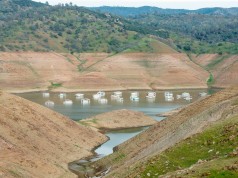 2014 may be well set to be one of the hottest years in the history of mankind. With CO2 emissions set to touch a record 40 billion tonnes this year alone, the world seems to be locked into an inevitable 1.5 degree rise. The commitments made by various agencies towards building new fossil fuel based power plants over the next 10 years, all across the world, will continue to contribute millions of tonnes of greenhouse gases.
2014 may be well set to be one of the hottest years in the history of mankind. With CO2 emissions set to touch a record 40 billion tonnes this year alone, the world seems to be locked into an inevitable 1.5 degree rise. The commitments made by various agencies towards building new fossil fuel based power plants over the next 10 years, all across the world, will continue to contribute millions of tonnes of greenhouse gases.
While it has been established with greater certainty that human induced carbon emissions cause global warming how the world will brace itself against a heating climate would be the biggest challenge for policy makers and the corporate world in 2015.
Governments from the developing world need to understand that the growth models followed by the West have little relevance today. The context of development has changed, and in the new context the developing world needs to push for innovative technology and funds to grow sustainably.
Climate change has been found to have triggered the 2013 heat waves, extreme rainfall, floods and droughts in many countries. Findings indicate that the drought in California and Sahel region is caused by climate change. Studying the recent spate of extreme heat waves in Europe, it is estimated that the frequency will increase by 10 times by the turn of this century.
The risks of a warming climate are not restricted to territorial boundaries; therefore resorting to resource nationalism is counterproductive. Governments adopting such measures, such as those of Australia and Canada, are creating the biggest hurdles in achieving an internationally coordinated mechanism to fight climate change. The climate change puzzle cannot be solved without strong global cooperation and a supportive market mechanism.
2014 has seen much scientific progress made towards silencing critics of global warming phenomena. With more evidence trickling in from different research agencies on the role of climate change in recently experienced extreme weather events, the naysayers can stop believing (in a utopian world where) that Nature can be considered to be infinitely abundant. Managing the environment is better than not doing it.
The tragedy with the climate change puzzle is that the biggest culprits may not be the worst suffers, primarily because they have the resources to protect themselves, to a relatively greater extent, from extreme weather events. It will be the poor countries that will suffer the most. It is observed that funds allocated to poor countries to fight climate change invariably get siphoned off to fight basic problems of education, health and other requirements. The poor countries are unfortunately positioned precariously.
Last year, 22 million people were displaced by natural disasters. Countries in East, West and Central Africa, India and South-East Asia – are more prone to climate risks. Climate change has been found to increase the vulnerability of drought prone region of Sahel.
If population estimates are to be believed, the world population would be a whopping 11 billion by 2100. The worrying point is the fact that much of the population growth will happen in sub-Saharan Africa and other economically weak countries – and they are likely to be the worst hit by climate change. Developing countries must look for equity (with the developed countries) in terms of future preparedness to meet climate change impacts and not be fixated by historical wrongdoings of the rich nations.
2015 should be a year for bringing about this ‘sense of parity’ that is necessary to develop sustainably.
 The author is currently Editor at ThinktoSustain.com – a market space for ideas…
The author is currently Editor at ThinktoSustain.com – a market space for ideas…© 2014 ThinktoSustain.com. All Rights Reserved.



















